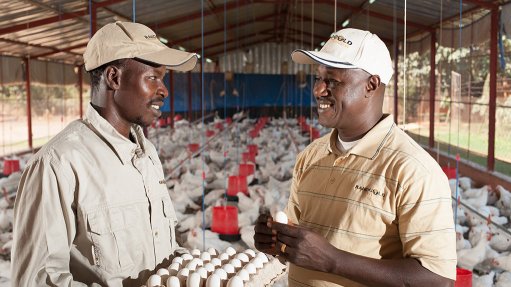
South African poultry producers have pledged to invest R1.7-billion towards expansion and improvement of productive capacity in the country.
Some investment projects have already been completed, including the expansion of a hatchery and processing facility which created 428 jobs.
This while the financing model for contract farming had been developed to assist in assessing producers’ business viability and profitability.
South Africa’s poultry output grew by 5% during the first eight months of the year, compared with the first eight months of last year, despite the challenges to the operating environment that were posed by Covid-19.
It helped that the Department of Agriculture, Land Reform and Rural Development ring-fenced R1.2-billion for assistance to financially distressed small-scale farmers, in a bid to support good production amid the nationwide lockdown.
The department, at the time, said it would focus the funds on poultry, other livestock and vegetables.
The poultry industry is the biggest agricultural industry in South Africa, employing more than 100 000 people throughout the value chain, with about three-million birds being slaughtered every day in the country.
In a prior statement, the South African Poultry Association said the industry aimed to increase production by between 10% and 20% by the end of 2022, which will require investment in processing facilities as well as farming to produce the chickens.
The association, reporting during an executive oversight committee meeting in recent weeks, said that the industry and government had reflected on the implementation of key actions agreed on by various stakeholders and measures required to realise the agreed vision.
This follows after the Poultry Sector Master Plan was signed by stakeholders at the 2019 South African Investment Conference held in November last year. The plan had been developed in close partnership between government and a number of stakeholders in the poultry industry, including producers, exporters, importers and organised labour.
The objectives of the master plan are aimed at increasing local chicken consumption and growing demand for chicken, while addressing the export of locally produced cooked and raw chicken products.
The Department of Trade, Industry and Competition (DTIC) previously identified the industry’s main challenges as rising feed costs, import penetration, rising electricity tariffs and access to reliable supply, exchange rate fluctuations and access to finance and markets.
To drive exports, the poultry industry has strategically prioritised countries such as Saudi Arabia, the United Arab Emirates and Qatar for the export of poultry products.
Additionally, the industry will target markets including the Southern African Development Community countries and those within the African Continental Free Trade Area.
“The South African poultry industry is an important part of the agricultural sector. The master plan provides a blueprint for the industry, with substantial potential to expand the poultry production across the value chain, especially if substantial export markets can be developed.
“Since the Master Plan was signed, government has implemented higher tariffs on certain cuts of poultry, and has further triggered an investigation into the structure of tariffs to provide a more effective trade environment for poultry.
“Further work has also been done with trading partners to improve compliance with sanitary and phytosanitary measures which would unlock further export markets,” the DTIC says.